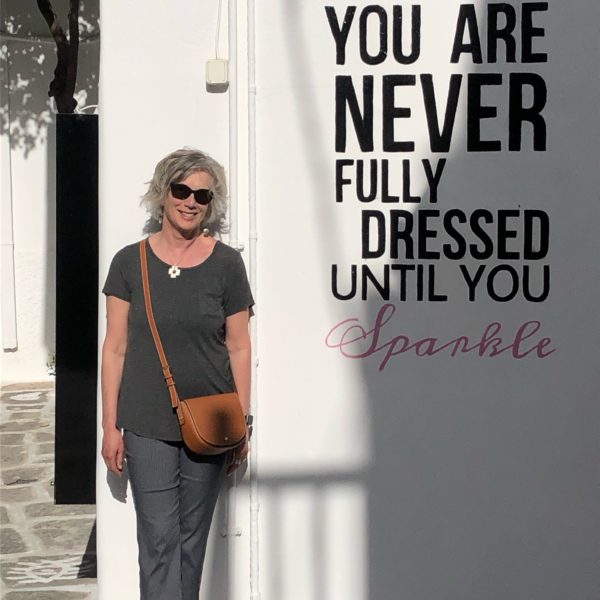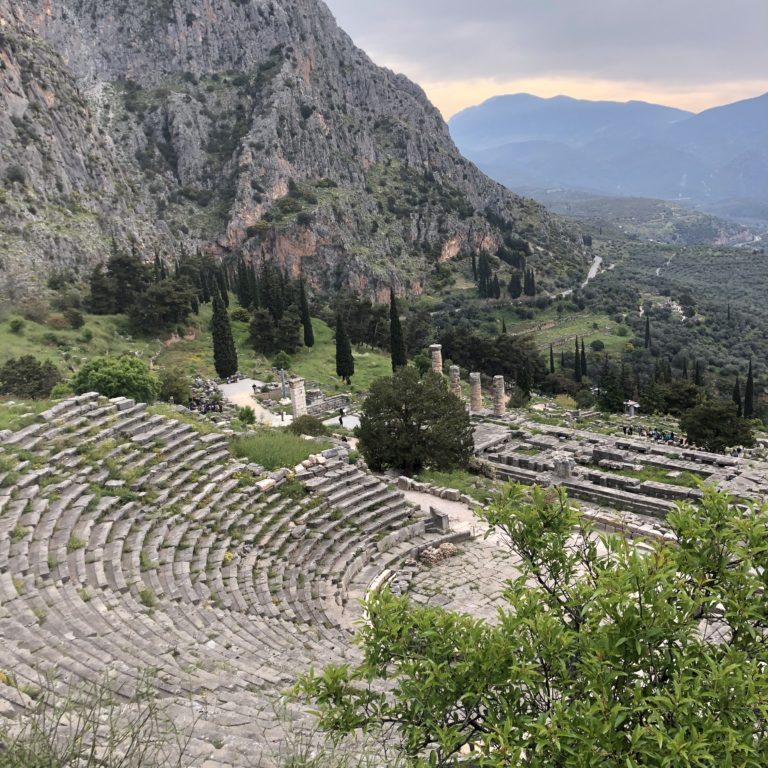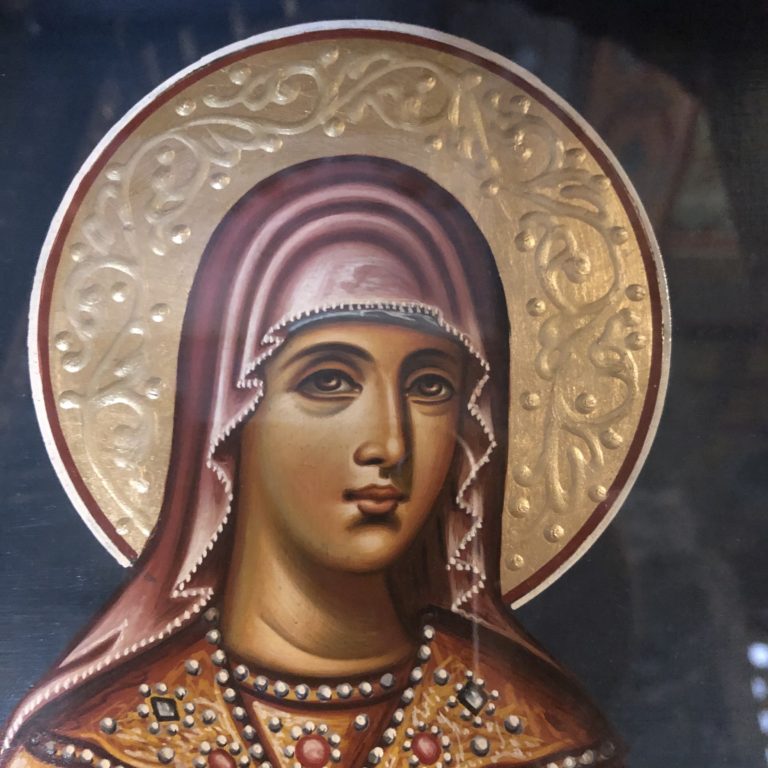I wanted to love Mykonos. I really did.
But, like the self-absorbed young Instagram women we saw, posing over and over to capture the perfect pout, flowing garments and windswept hair, Mykonos felt too polished, too concerned with her appearance and, as a result, less than authentic.
This is, of course, my fault; mine, and the millions of others who fell in love with those iconic images of Greece and then decided they must see it for themselves.
You know the pictures: the incredible luminosity of thickly painted white walls against pottery blue skies, the flagstones, gleaming down a narrow alley under a bower of magenta bougainvillea. The preening cats, the reflective sea, all of those iconic images are to blame for stripping the sense of soul from these over-visited villages.
Because it is due to those calendar shots and the resulting tourists that little local grocers are replaced with high-end restaurants and useful items in shops are abandoned in favour of Louis Vuitton and Gucci.
Airbnb’s replace homes as locals move further out to capitalize on the cash provided by visitors wanting an ‘authentic’ downtown locales.
The result is a beautiful Disneyland, pretty and perfect and devoid of soul, reduced to Instagrammable images by people like me.
It is still charming and oh-so-pretty but empty of all that animates it as a community.
The locals shop and live outside of town, only coming in to serve the endless tour bus loads of foreigners.
Yet all this commerce provides badly-needed income to Greeks who have suffered years of economic insults.
Our visit to Paros was better. The place felt more like it still belonged to the locals as they went about their business, living in their neighbourhoods, not yet driven out from the core. It was lovely to watch people greeting each other at the endless coffee shops. Everyone knew everyone that passed by and was greeted with enthusiasm, hugs and kisses.
But you can see the change coming as higher-end shops displace local little stores. But again, who can deny the hardworking citizens their opportunity to capitalize on the visitors?
We are both the problem and part of the economic solution.
But the very thing we hope to experience; the opportunity to, however briefly and superficially, interact with local people living in their communities is diluted with our arrival.
In bigger cities, like Athens or Thessaloniki, tourists are absorbed into the larger population.
But in smaller places, like the aforementioned Mykonos, the tourists appear to outnumber the locals, until soon, the town is only masquerading as itself.
Just like everything else I think about, I always end up with more questions than answers.
Still. I strongly believe in the power of travel as a vehicle to improve cross-cultural understanding and the possibility of peaceful coexistence (please note that I have purposely omitted the commonly used addition of the word tolerance. It always sounds to me like putting up with something while retaining an innate superiority to the very thing one is ‘tolerating’).
But I digress…
The trick, it seems to me, is how to learn about each other without overwhelming the very place we’ve come to visit.
There is so much talk of sustainable tourism. Perhaps sustainability has to include not just the environment but also its inhabitants?
How can locals create and build their livelihoods through tourism while still retaining their essential sense of place?
It isn’t easy. As we all know, in the simplest of science experiments, it is the very act of observation that has an unintended influence on the outcome.
By simply inserting ourselves into the landscape, we change it.
I thought about this as I watched the old woman dressed in black, genuflect before entering one of the endless numbers of Greek Orthodox churches here on Paros.
I watched too, as a young girl knelt beside her grandmother, learning how to be devout as she mimicked the old lady’s example of kissing each of the icons in one of the churches in Thessaloniki.
Did my dispassionate observation take away from that little girl’s worship?
Or did her devotion rub off on me?
It might have been the latter, because for one fleeting moment as I stood in that candlelit sanctuary, I wished for the ability to have that kind of feverish belief.
It reminded me of the devotion I’d observed in Hindu temples in India or the adoration seen at the foot of a gilded Buddhist statue in Thailand or the distraught tears of the Guatemalan man as he wiped the forehead of the wooden crucified Christ.
But still, no matter what I’ve seen or where I’ve been, the faith in any of these stories eludes me.
Wandering through Delphi, I wondered if I would have been an unbeliever in those times too? Would I have missed out by not having faith in Apollo and Zeus?
Back in those long-ago centuries, that we now measure as Before Christ, would I have worshiped those all-knowing deities or passed it off as fable?
If I had believed in Artemis, how would it have felt when the conquering Romans arrived and renamed my goddess as Diana?
And what was it like for later generations when Diana was knocked from her pedestal and replaced by the next wave of believers with their Virgin Mary?
Each time, each era holds fast to their beliefs to help them navigate and explain the inexplicable. Then the next generation comes along and readily dismisses the past religions as myths and legends, oblivious that future generations will also refer to their own era’s certainties as quaint stories of a naive people.
Waves of successive generations roll one belief into the next. Conquerors bring new gods, displacing beliefs and allegiances through force or conviction. And now, through global travel and the sharing of ideas through cyber connections, completely new ways of thinking are shared.
Yet, it is so often the religious beliefs that inform each culture with their majestic cathedrals, mosques, temples and shrines. These are often the very things that imbue a destination with its art and soul. These are the things we come to see and experience.
Do the Greeks, the majority of whom are believers in the Greek Orthodox Church, ever wonder about all the ancient ruins that surround them, remnants of a time when all the populace worshipped such different gods than now?
As we hurtle through space on this tiny blue marble, I am left knowing only one thing. Our myths and stories are imperfect but they are all trying to achieve the same result; to provide us with meaning and a sense of where we belong within this incredible and infinite universe.
We create art and icons in the hopes of expressing the ineffable.
Like the shadow in Plato’s cave, it all points toward something bigger than ourselves.
Visiting our neighbours and seeing how they believe and love and live, is a good first step in understanding. Perhaps it is the only thing we can do.
Maybe I do believe in something after all.
Yes, I do.
I believe in humanity and our beautiful quest for meaning. I believe in our ability to not only love ourselves but also those who are different than us.
I believe that peace comes through understanding and that by traveling beyond what is familiar, whether it is a journey of a city block or a flight around the world, we might begin to facilitate that peace.
I believe in love, and I believe that at their very core, so do all religions.
“And now these three remain: faith, hope and love. But the greatest of these is love.”
~ 1 Corinthians 13:13












“We are both the problem and part of the economic solution”. You said it all in this sentence. Of course tourism is good for a country, it brings much needed cash for poorer countries and help improve businesses but I feel that when tourists visit a country they should show respect for the local population they should try to blend in, they should eat the local cuisine and “converse” with people and try to learn and understand a country without imposing their ideas. Let’s share our humanity. I believe in love.
I do agree Catherine. Respect for the local culture is key. One of the amazing things about travel is the opportunity to be a tiny part of how other people live. Food is such a key part of that.
What a beautiful post, Colleen. you capture the essence and the place, and make our lives so much richer by reading what you’ve written.
Sophie. There is so much to think about while exploring a place with such visible history. Thank you for reading and your kind feedback.